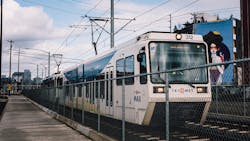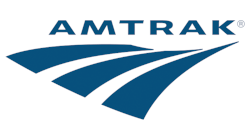Excessive heat impacts passenger rail and transit operations in Pacific Northwest
The heatwave that has settled in the Pacific Northwest during the past few days is expected to continue through Tuesday and has impacted regional rail and light rail service.
The National Weather Service (NWS) reported Portland, Ore., reached 112°F Sunday, which is the highest temperature since records began in 1940. The high in Portland is forecast to be 115°F on Monday.
NWS Seattle reported the city also reached a new all-time high on Sunday with a high of 104°F, which beat the previous record of 103°F set on July 29, 2009. Seattle is forecast to be 109°F on Monday.
Amtrak Cascades service issued an alert June 25 that trains would be operating a reduced speeds through Monday due to heat restrictions. The railroad explained extreme heat can cause railroad tracks to shift* slightly, prompting the operations to slow down as a precaution.
Sound Transit issued alerts throughout the weekend that Link light-rail trains were operating at reduced speeds due to excessive heat on the tracks. Additionally, the agency warned Sounder trains could be delayed or operate at reduced speeds.
In Portland, the city suspended Portland Streetcar operations Sunday and Monday citing heat-related power issues.
"Sagging overhead wires, power issues on the Broadway Bridge and a downed tree limb on the overhead wires downtown all led to delays, speed restrictions and other problems on the system," the streetcar service said. "Rather than leave riders stranded while trying to travel, all streetcars were returned to the maintenance yard Sunday afternoon."
The heat appears to have, literally, melted portions of the the streetcar's power cables.
TriMet suspended service on all MAX lines until Tuesday. In a statement, TriMet said its MAX system is designed to operate in up to 110°F heat, but the historic heat is “straining the power grid and the overhead wires that power MAX trains.”
TriMet reported heat-related mechanical issues Sunday on MAX Blue, Green, Red and Yellow lines. The agency noted it could take time for the system to cool off.
The MAX trains are powered through catenary wires made of copper. These overhead wires expand as temperatures rise and can sag. When temperatures rise to the level the area has experienced recently, counterweights designed to keep the wires taut hit the ground, allowing the wires to continue to sag. Cooling is the best remedy for this situation.
“We appreciate our riders’ understanding and encourage everyone to stay hydrated and to not travel right now unless it’s necessary. Every light-rail system has certain thresholds beyond the usual operating environment that force temporary changes in operations, be that low or high temperatures,” TriMet said. “While the MAX system is engineered to withstand temperatures of around 110 degrees, the current heat wave is dangerous not just for its severity but also its duration and the lack of cooling overnight.”
TriMet also implemented a heat operation plan for its WES rail service where reduced speeds would be implemented if temperatures were to hit 100°F and, should temperatures rise to 105°F, WES service would be suspended and shuttle buses would be brought in as substitute service.
Temperatures in the Pacific Northwest are expected to remain above average through the first week of July, but the record-setting heat is forecast to move east later in the week.
* These shifts or buckles are called sun kinks and can cause derailments. For more information on track buckling, U.S. Department of Transportation’s Volpe Center has performed research on the subject or, for a quick overview of the topic, OC Transpo has produced a short and informative video.

Mischa Wanek-Libman | Group Editorial Director
Mischa Wanek-Libman is director of communications with Transdev North America. She has more than 20 years of experience working in the transportation industry covering construction projects, engineering challenges, transit and rail operations and best practices.
Wanek-Libman has held top editorial positions at freight rail and public transportation business-to-business publications including as editor-in-chief and editorial director of Mass Transit from 2018-2024. She has been recognized for editorial excellence through her individual work, as well as for collaborative content.
She is an active member of the American Public Transportation Association's Marketing and Communications Committee and served 14 years as a Board Observer on the National Railroad Construction and Maintenance Association (NRC) Board of Directors.
She is a graduate of Drake University in Des Moines, Iowa, where she earned a Bachelor of Arts degree in Journalism and Mass Communication.





